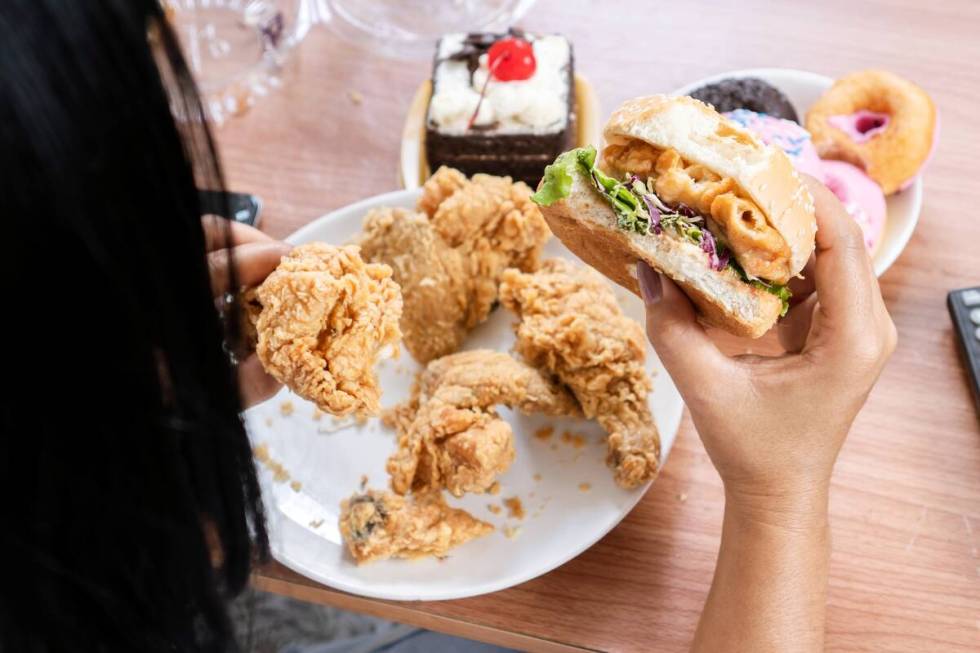What are the signs of a binge eating disorder?

Question: My niece is living in my home while she is attending college. I’ve invited her to eat meals with our family, but she typically declines, desiring to eat alone in her room. I’m concerned because she often seems to eat a lot of food at one time, like two sandwiches with two bags of chips or a quart of ice cream. Could this be a sign of an eating disorder? If so, what can I do to help her?
Answer: Most people eat too much occasionally. They may fill up an extra plate with seconds at a special event, enjoy another piece of pie at a holiday gathering or eat popcorn until stuffed at the movies. There’s no reason to be concerned if this happens occasionally.
But, for some people, overeating can become excessive. It is possible that your niece is suffering from a binge eating disorder if her excessive eating habits feel out of control and happen on a regular basis. It’s the most common eating disorder in the U.S.
People with a binge eating disorder may feel embarrassed about overeating but have a strong, compulsive urge to continue eating. Like your niece, they often eat alone or in secret because they feel ashamed or guilty about their eating.
Binge eating disorder is more common in women than in men. People of any age can have binge eating disorder, but it is most common in younger and middle-aged people. The average age when it first occurs is about 25 years old. A person’s size doesn’t increase their risk, as the disorder can affect people who are underweight, overweight or at an average weight.
Many people who have a binge eating disorder have a long history of dieting. They have tried and failed many diets and may have poor body image as a result. While dieting, they restrict calories or specific foods for a while, but then are triggered to binge eat. It’s also more common in people who have depression, have a high level of stress in their lives or use food to cover intense emotions.
There are many signs of a binge eating disorder. Mainly, it’s distinguished by a regular occurrence of eating more food than most other people would in a similar situation. Other signs to watch for in your niece include:
— Eating unusually large amounts of food in a specific amount of time, such as over a two-hour period.
— Feeling that eating behavior is out of control.
— Eating even when full or not hungry.
— Eating rapidly during binge episodes.
— Eating until uncomfortably full.
— Frequently eating alone or in secret.
— Feeling depressed, disgusted, ashamed, guilty or upset about eating.
— Frequently dieting, possibly without weight loss.
Often, people with binge eating disorders have become experts at hiding their eating behaviors. They may deny there is an issue or lie about the amount of food they eat.
Binge eating can lead to obesity, joint problems, heart disease, Type 2 diabetes and sleep apnea. It can be difficult to function in social settings, and the person may isolate or withdraw from others. This can increase anxiety, depression and substance use disorders.
Overcoming any eating disorder is a challenge because people can’t avoid food or social situations that include food during recovery. Your niece’s body needs food to survive and thrive. Recovery is possible, and many people overcome binge eating completely.
Treatment needs to address the emotions tied to binge eating, including shame and poor self-image. Relapse is likely until these are tackled, and professional help usually is necessary. A combination of cognitive behavioral therapy and medications, such as antidepressants, can help your niece cope with triggers, negative body image and depression. These treatments can help binge eaters regain a sense of control over behaviors and improve stress management skills.
At the same time, a dietitian can work with her to reframe her relationships with food, ensure she is getting the right balance of nutrients, help develop meal plans and offer support for navigating social events that involve food.
Binge eating disorders are serious, but full recovery is possible with professional treatment. I encourage you to talk with your niece and her parents about your concerns and offer to help her get the care she needs.
Romi Londre is a registered dietitian nutritionist with the Mayo Clinic Health System in Eau Claire, Wisconsin.